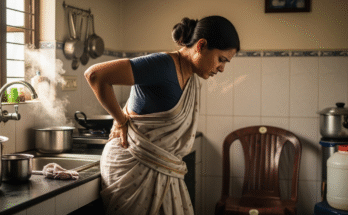Diarrhea (atisar in Ayurveda) and irritable bowel syndrome (sangrahani) are distressing intestinal disorders that disrupt daily life. Characterized by loose, foul-smelling stools, abdominal pain, cramping, and irregular bowel movements (sometimes loose, sometimes thick), these conditions are often triggered by contaminated water or food. Left untreated, they can lead to dehydration and weakness. Fortunately, Ayurveda offers gentle, natural remedies using ingredients like cumin, fennel, bay leaf, cinnamon, and tulsi seeds to soothe the gut and restore balance. In this blog, we explore the causes of atisar and sangrahani and share five effective remedies to help you find relief by Diarrhea home remedies.
Understanding Diarrhea and Sangrahani
Atisar (diarrhea) is marked by frequent, watery, and foul-smelling stools, often caused by contaminated water, spoiled food, or poor hygiene. Sangrahani (irritable bowel syndrome) involves chronic digestive issues with alternating loose and thick stools, accompanied by:
- Abdominal Pain: Sharp or dull pain in the stomach.
- Cramping and Twisting: Uncomfortable spasms in the intestines.
- Foul-Smelling Stools: Loose stools with an unpleasant odor.
- Irregular Bowel Movements: Fluctuating between diarrhea and constipation.
These conditions arise from imbalances in the body’s agni (digestive fire), often due to bacterial infections, stress, or improper diet. Let’s dive into five Ayurvedic remedies to address these issues naturally.
5 Effective Ayurvedic Remedies for Relief

1. Roasted Cumin Powder with Curd
Cumin (jeera) is a powerful digestive aid that calms the gut and reduces inflammation, making it ideal for diarrhea relief.
How to Use:
- Roast 1 teaspoon of cumin seeds on a pan until fragrant.
- Grind into a fine powder.
- Mix with 1 cup of fresh curd and consume twice daily after meals.
Benefits:
- Soothes abdominal pain and cramping.
- Reduces frequency of loose stools.
- Restores gut flora with curd’s probiotics.
Why It Works: Cumin’s antimicrobial properties fight infection, while curd cools the digestive tract.
2. Roasted Fennel Powder with Buttermilk
Fennel (saunf) is known for its carminative properties, which help relieve gas and diarrhea. Combined with buttermilk, it aids digestion and hydration.
How to Use:
- Roast 1 teaspoon of fennel seeds on a tawa until aromatic.
- Grind into a powder.
- Mix with 1 cup of buttermilk and drink once or twice daily.
Benefits:
- Reduces foul-smelling stools and bloating.
- Eases intestinal spasms.
- Rehydrates the body.
Why It Works: Fennel soothes the gut lining, and buttermilk provides electrolytes to combat dehydration.
3. Bay Leaf and Cinnamon Decoction with Catechu
Bay leaf (tejpatta) and cinnamon (dalchini) are potent remedies for stopping diarrhea quickly, especially when combined with catechu (kattha).
How to Use:
- Boil 2-3 bay leaves and ¼ teaspoon cinnamon powder in 1 cup of water for 5 minutes.
- Add a pinch of catechu to the decoction.
- Strain and drink warm, once daily.
Benefits:
- Stops loose stools almost instantly.
- Relieves abdominal pain and cramping.
- Fights bacterial infections.
Why It Works: Bay leaf and cinnamon have astringent and antimicrobial properties, while catechu binds stools.
4. Rice Water with Black Salt and Roasted Asafoetida
Rice water (chaval ka mand) is a traditional remedy for diarrhea, enriched with black salt and asafoetida for added benefits.
How to Use:
- Boil 2 tablespoons of rice in 2 cups of water until soft.
- Strain the starchy water (mand).
- Add a pinch of black salt (kala namak) and a pinch of roasted asafoetida (hing).
- Drink warm, twice daily.
Benefits:
- Reduces frequency of stools.
- Soothes intestinal irritation.
- Replenishes electrolytes.
Why It Works: Rice water binds stools, black salt aids digestion, and asafoetida reduces gas and spasms.
5. Tulsi Seeds with Cow’s Milk
Tulsi seeds are a lesser-known but effective remedy for diarrhea, especially when combined with cow’s milk for nourishment.
How to Use:
- Grind 5-10 tulsi seeds into a fine powder.
- Mix with 1 cup of warm cow’s milk.
- Drink once daily, preferably in the morning.
Benefits:
- Controls loose stools and foul odor.
- Strengthens the digestive system.
- Reduces abdominal discomfort.
Why It Works: Tulsi seeds have antimicrobial and astringent properties, while cow’s milk provides gentle nourishment.
Lifestyle Tips to Prevent Diarrhea and Sangrahani
To complement these remedies and prevent recurrence, adopt these habits:
- Drink Clean Water: Use boiled or filtered water to avoid contamination.
- Eat Fresh Foods: Avoid stale, spicy, or oily foods that irritate the gut.
- Stay Hydrated: Sip electrolyte-rich drinks like buttermilk or coconut water.
- Practice Hygiene: Wash hands thoroughly before eating or preparing food.
- Manage Stress: Practice yoga (e.g., Balasana) or meditation to balance digestion.
- Light Diet: Stick to easily digestible foods like khichdi, bananas, or boiled rice during recovery.
When to See a Doctor
These remedies are effective for mild to moderate symptoms, but consult a healthcare professional if you experience:
- Persistent diarrhea lasting over 2 days.
- Severe dehydration (dry mouth, dizziness, low urine output).
- Blood in stools, fever, or severe abdominal pain.
- Symptoms of chronic sangrahani despite remedies.
Conclusion
Diarrhea (atisar) and sangrahani can be debilitating, but Ayurveda’s natural remedies offer a gentle path to relief. Using ingredients like cumin, fennel, bay leaf, rice water, and tulsi seeds, you can soothe abdominal pain, stop loose stools, and restore digestive health. Combine these remedies with a clean diet and good hygiene to prevent recurrence. Embrace the wisdom of Ayurveda and reclaim your well-being today!




